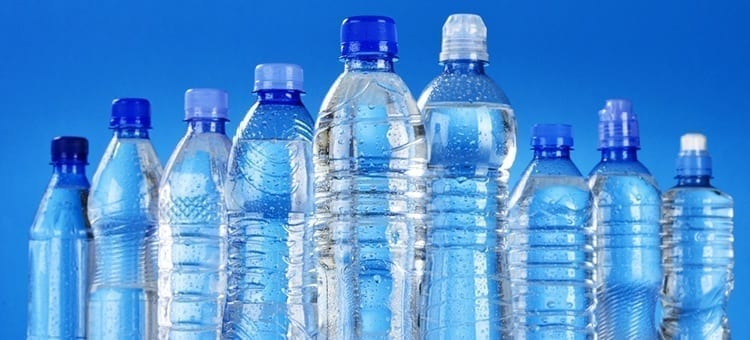What chemicals are in bottled water?

Scientists in Germany conducted a study to discover what chemical components are found in Bottled Water after the Removal of BPA’s. what they found is quite astounding.
Endocrine disrupting chemicals, called EDC’s, are man-made compounds which can interfere with hormone signalling and thereby adversely affect Human Health. Upon looking at recent evidence for the presence of these chemicals in Bottled Water all of the world, they found what is called Steriod Receptor agonists and antagonists. Out of 18 different brands of Bottle Water they found these chemicals in 13 out of the 18 products, in which these chemicals blocked steriod receptor by 90%.
The study starts quoting:
“By interfering with the organism’s complex hormone signaling endocrine disrupting chemicals (EDCs) might adversely affect development and reproduction [1], [2]. Moreover, recent research suggests an implication of EDCs in cancer, cardiovascular, and metabolic disorders [3], [4], [5]. While research generates an ever-growing list of potential EDCs, few compounds, namely Bisphenol A (BPA) and phthalates, attract particular scientific attention and public controversy. Used in a vast variety of consumer products, these chemicals are ubiquitously detected in the environment as well as in human samples [6], [7], [8]. With numerous studies documenting adverse effects [9], [10], public health concerns have led to a voluntary or regulatory removal of BPA and phthalates in some products (e.g., baby bottles, toys) and countries.
However, given the multitude of chemicals in use, these measures might not resolve the problem. This is illustrated by a recent study suggesting that plastic products marketed as BPA free release significant amounts of estrogenic activity [11]. The authors employed a sensitive in vitro bioassay to characterize the total estrogenic burden leaching from plastics, including potential mixture effects and unidentified EDCs. Using a similar approach, a series of studies reported a widespread estrogenic contamination of commercially available bottled water [12], [13], [14], [15], [16], [17]. Another study adds to the picture by presenting new findings on androgenic, antiandrogenic, progestagenic, and glucocorticoid-like activity in bottled water [16].
Well who Regulates what chemicals are allowed in bottled water?
The Australia New Zealand Food Authority (FSANZ) regulates bottled drinking water, which is classified as a “food”. The Western Australian Department of Health (DoH) regulates our tap water. Amazingly, the DoH guidelines for tap water are stricter than the FSANZ restrictions for bottled drinking water! You might buy bottled drinking water that is acceptable to the FSANZ but is not acceptable for use as ordinary bathroom tap water.
What can i do then?
The answer is pretty simple: DON’T DRINK BOTTLED WATER! other than that, here are two things you can do:
- Install a water filter for your home (Click HERE for your range of Home Filtration systems)
- Get yourself either a glass bottle or Stainless steel bottle. These won’t leech anything into your filtered water.
24,000 chemicals is alot to be putting into your body from just one sip of a bottle. Not all of them are harmful, but why would you want to take that chance? It is not uncommon for some people to even taste the difference water has when it come from bottles, especially if you leave that bottled water in the sun for even a short period of time.

Recent Comments